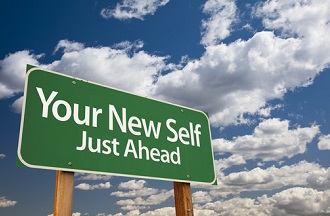Part 1
The story begins with me moving from mountain to cat, passing through cat tuck. Leading with the back of my neck, I pull forward, bringing my knees to ground and curling my spine outward, tucking my chin, chest, and stomach in, in, in, then flattening it all to natural alignment starting at the tailbone and moving up the spine to my head.
I kneel in cat, wrists under shoulders, head forward, back straight. The teacher approaches and reaches down to touch the vertebrae between my shoulder blades. “Can you straighten here?” she asks. I let my spine sink between my shoulder blades. “You don’t want to make a valley,” she says. I lift my spine back up a little. She presses down. “Now what about this vertebra?” I feel her finger on the bone, and I know how she wants me to move, but I can’t imagine how to move there. “It’s as if you’re beginning cobra,” she says, and so I pull my shoulders down my back, lift up through my chest. “Where are you feeling that? What are you tightening to make that happen?” she asks.
“My arms,” I say, and my armpits are quivering with effort but it’s not quite my arms—this position is creating a curious feeling in my stomach and chest, an opening that feels close to a breaking. It doesn’t hurt, but it’s difficult—and new. It’s also triggering insight: this is my problem, this is the weak link. “That’s what you want,” she says. “Every time. Every time.”
Oh the ecstasy of self-improvement fantasies. I walked home marveling at the new lift in my chest and ribs, the catch of my breath as if the top of my lungs weren’t used to such space and struggled to fill it. I envisioned a new me, one who, empowered by strength in the small connective muscles of my back, could throw farther, lift more, sing louder, swing a bat faster, and impress my father-in-law with my steady grip on the pistol we shoot once a year or so at the hunting camp.
Poor unimproved former self, I thought. That unenlightened she found it easier to breathe when slightly slumped, could push herself harder and farther if she went sloppily, bullying past her field of energy instead of staying in it. But this NEW self leads with her heart. She moves deliberately, discerning what is needed from what is not. She knows how to be where she is and how to fill that space. She will never slump again.
Part 2
Cat/Dog & Other Binaries. That’s my new book, my first book. It looks real, right? It is real.
Can I tell you it is self-published? Can I say that without it feeling like a confession? It’s a book of poems, and it didn’t win any contests. No one important wrote a blurb. The back cover is blank but for my bio and a barcode. I paid for the rights to use the cover art, and I looked at other poetry books to figure out how to format the front and back matter. I chose the font type and size and spacing. I set the price. I wrote the description for amazon.com. I did it by myself on createspace.com, a division of Amazon.
My motivation to self-publish was 80% closure (i.e., get these 10-year old poems out of my head so I can move on) and 20% hope (i.e., maybe someone will like them). The first draft of my book bio: “She is happy to put this book (her first) into the world so she can forget about it and move on to other things.” I thought it was amusingly self-deprecating at the time, but on one of my final proofs it suddenly sounded sad and a little F-you if you’re dumb enough to buy this book. Shame runs deep. I haven’t worked hard enough, I haven’t tried hard enough to win a first book contest, I don’t participate enough in the literary community. Someone important will see this and shake their head: There’s a lot of crap out there.
I changed the bio. Cutting out that sentence made it bland, but it dissipated the darkness that hung around the whole process. It inspired some much-needed revisions of a couple of poems I’d been pretending were okay. It made me excited, finally. I wrote a book! I can give it to people! Some people might even buy it!
And then the ensuing upward spiral…I will give this book of poems to people, I fantasized, and their enjoyment will grow to a fervor. They’ll tell their friends, who will tell their friends, some of whom will work at libraries and bookstores, and I’ll be invited to read, to autograph, to write the screenplay. Someone famous will nominate my book for a famous prize. More importantly, I will not be someone who has regrets on her deathbed. I will instead have a pile of my own books around me, testament to my warm embrace of the person I was meant to be.
Part 3
I’m a sucker for self-improvement. Caught in my visions of perfection, I never dream that I could backslide to that former dud of a self. But every time, I do. Even now, as I write this, I’m slumping in my seat and worrying that I might never finish a book again.
I could take comfort in the Buddhist teaching that I’m already whole, that I can stop striving and just be where and who I am. But if I give up on a new self, then what becomes of these moments of experience that feel so true and inspirational? Do they matter?
Not really. What matters is that I took a single moment in yoga class and my excitement about my book and turned them into thoughts: thoughts of perfection and self-worth, thoughts of the future, thoughts of the past. All of these thoughts are illusion, and any indulgence in illusion comes with a crash. When I fail to live up to my vision, I’m left with guilt and shame.
What matters is that I did something brave with my poems. I finished something, released it to the world as a thing, an artifact, and by doing so removed it from the possibility of change. If it can’t change, I can stop thinking about it. (If only I could publish myself, right? Then I could stop thinking about her…)
What matters is the moment of connection with my yoga teacher. I went to yoga that night grudgingly, resenting how long it would take and how crowded it would be. Instead, I was given a gift, perhaps for that night only, that made me happy I went.

